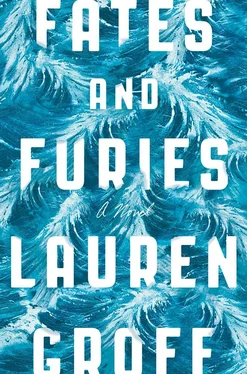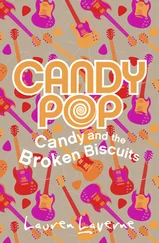Go sings, alone, her love song. She begins to slowly weave her wedding dress. Red.
Outside, the underground station is finished, people start getting on, getting off. They are the gods, in street clothes. You know they’re gods by the shine they emit compared with the other passengers. We have been diminished, they sing. Gods are only stories now. Immortal still, but powerless.
They get on and off the underground train as they sing.
Ros returns in ratty clothes, looking urgent and hairy and homeless. He presses his face against Go’s wall and sings the love song. In relief, they sing a bit of their duet, but Go’s version has changed again. She takes the song darker, getting more and more frantic and fervent, fighting against her wall, punching and kicking it as Ros constructs a small cardboard house, pads it with newspaper, rolls out a sleeping bag, settles in.
I won’t leave you, Ros sings. You’ll never be alone again.
[Entr’acte: a five-minute video overlay like before. London swells and grows above them, the Gherkin, the Olympic Village, forward into massing overwhelming overcrowding, riots, fires, darkness, disaster.]
ACT III: ESCHAT
Opens to find Ros lying where he was at the end of the previous act, but he is ancient, the underground station filthy, graffiti-tagged, nightmarish. The apocalypse is upon them. Go is exactly the same, but more beautiful in her great floating red wedding dress, the bats even more uncanny; bald pink babies with wings, hanging upside down. Muzak, or the most soulless music on the planet. [Apologies, Leo.] It is interrupted with static and strange distant rumblings growing closer.
Ros sings to Go about the people going by, he has learned her language, but we begin to understand that he’s turning the ugly world to beauty.
There’s a fight on the platform, and the audience slowly realizes that one of the fighters is a god, his light diminished, looking as bedraggled and ancient as Ros; it’s Hermes; one knows by the wings of dirty light on his sneakers. Ros gapes.
Tell me about the sun, Go says. You’re my eyes, my skin, my tongue.
But Ros is disturbed by what he has witnessed. The gods have forgotten themselves, Ros sings, as if to himself. He presses both hands on his heart, suddenly stricken with pain. Something is wrong, Go. Something has gone wrong inside me.
She says no. She says he is her young and beautiful husband. He has made her love mankind again. He is only good, inside.
I am old, Go. I am sick. I am sorry, he sings.
The gods gather around, sing, complaining about their woe and the woes of the world. Where in the beginning there was grandeur, brilliant light, great seriousness, there is now unutterable, almost comic, diminishment. Go is overwhelmed, presses her hands over her ears.
Ros crumbles. The world is not what you … he begins, but doesn’t finish.
Go sings a love song to him. A video projects on Ros’s body, his soul rising, young, with coins on his eyes; it walks off on a slant of light; on the singer’s prone body, a video is projected of deflation, a whittling to bones.
Ros? Go sings. The single word, over and over and over, no music. Shouting.
At last, she screams to the gods to help her. In English, now, Help me, gods. Help me.
But the gods are preoccupied, the blasting sounds so very loud and close now, their columns of light empty, and they are fighting, all hoboes, dirty slapstick fighting; yet it’s deadly stuff. Minerva garrotes Aphrodite with a laptop charger; Saturn, a filthy, naked giant of an old man, reaches blindly for his son Jupiter, but gobbles a rat à la Goya; Hephaestus comes in with great steel robots; Prometheus throws a Molotov cocktail at him. It’s all terrible, bloody, until Jupiter wheels out a great red button.
Hades summons his shades, who bring out another red button.
A standoff song, each faking the other out.
[Go has been swirling around her cave, first slowly, then with increasing speed.]
In the silence, one can hear Go moaning, Ros, Ros, Ros .
Suddenly, both gods press their buttons. Huge light flash, cacophony. Then silence, darkness.
Go begins, slowly, to glow. [All other light in the theater — aisle lights, exit lights — extinguished. A darkness to inspire panic.]
Please, she shouts, once, in English.
Nobody answers.
Silence.
[Leo, hold the silence until it is unbearable; one minute, at least.]
Go is alone, she sings. Deathless Go in a dead world. There is no fate worse than this. Go is alone. Alive, alone. The only one. She holds her last note until her voice breaks, and then beyond.
She folds in half on herself until she is in the position we have found her in.
The only sounds are wind, water. A slow and ancient heartbeat increases until it overcomes the wind and water noise, and becomes the only thing we can hear. There can be no applause in the intensity of this noise. There is no curtain closing. Go stays folded in her position until the audience files out.
END
THERE WERE FOUR PLAYWRIGHTS for the symposium on the future of theater, the university so rich it could bring them in all at once: the girl prodigy in her twenties, the Native American dynamo in his thirties, the antique voice of theater whose best work was forty years deep in the last century, and Lotto, forty-four, representative of middle age, he supposed. And because the morning was glorious, brimming with chill wind and neon-pink bougainvillea light, and because all admired one another’s work to various degrees, the four playwrights and the moderator fully partook of the bourbon and gossip in the green room while waiting for the event and they were soused by the time they took the stage. The auditorium held five thousand seats and all were full, as was the overflow room with an LED screen, and there were people sitting in the aisles, and the lights were so bright those onstage could barely see beyond the front row, where the wives sat together. Mathilde was on the outside edge, elegant platinum head on fist, smiling up at him.
Lancelot soared along on the applause and the lengthy introductions, replete with short scenes from each playwright’s work acted out by theater majors. He was having difficulty following along. He must have had more bourbon than he thought. His own play he could understand; the Miriam from The Springs was perfect, sex in a dress, all chesty growl and hips and shining copper hair. She would have a life on film, he knew it. [Yes, small roles, hers a small spark.]
Now the discussion. Future of theater! First thoughts? The codger began his grouse in a pseudo-British accent. Well, radio didn’t kill the theater, then films didn’t kill the theater, then television didn’t kill the theater, and so it was a bit daft to believe that the Internet, as seductive as it was, would kill the theater, wasn’t it? The warrior went next: marginalized voices, voices of color, voices traditionally repressed will be heard as loudly as anyone’s, drowning out the voices of the boring old white men of the patriarchy. Well, Lancelot responded mildly, even boring old white men of the patriarchy had stories to tell, and the future of theater was like the past of theater: creating innovation in storytelling, inverting narrative expectations. He smiled; so far, only he had had applause. They all looked at the girl, who shrugged, bit her fingernails. “Don’t know. Not a fortune-teller,” she said.
Impact of technological age? We are in Silicon Valley, after all. Audience laughed. Warrior leapt in, kicking his dead horse: with YouTube and MOOCs, and all the other innovations, knowledge has been democratized. Looked at the girl, seeking alliance. With feminism equalizing home work, women are given the freedom from childbearing and drudgery. A farmer’s wife in Kansas, who once had to be only a housekeeper, who had to put up the fruit and wipe the bottoms and churn the butter, et cetera, could have half her workload shared and could go from wifey to creator. She could listen to the newest innovations on her computer; she could watch new plays from the comfort of her home; she could learn how to compose music all by herself; she could be the creator of a new Broadway show without ever having to live in the soulless third circle of hell that is New York City.
Читать дальше












